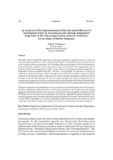Please use this identifier to cite or link to this item:
https://cris.library.msu.ac.zw//handle/11408/1849Full metadata record
| DC Field | Value | Language |
|---|---|---|
| dc.contributor.author | Chakauya, Fadzai | - |
| dc.date.accessioned | 2016-10-18T10:00:24Z | - |
| dc.date.available | 2016-10-18T10:00:24Z | - |
| dc.date.issued | 2016 | - |
| dc.identifier.issn | 1815-9036 | - |
| dc.identifier.uri | http://hdl.handle.net/11408/1849 | - |
| dc.description | A Publication by Fadzai Chakauya a Lecturer in the Faculty of Law, Midlands State University | en_US |
| dc.description.abstract | This paper seeks to highlight the importance of having an independent regulator and gives a critique of International best practices visa vie the role played by POTRAZ. International law plays a significant role in the regulation of telecommunications. The International Telecommunications Union recommends that a telecommunications regulator must be independent as agreed at the World Trade Organisation Fourth Protocol to the General Agreement on Trade Services Annex on Telecommunications provides for an independent telecommunications Regulator. Thornton et al highlights the importance of having an independent regulator as having an impact on the effectiveness of the market regulator, dependent on policy enforcement and market perception. Independence is not from regulation principles as contained in policies but rather an element that dominates the manner in which the policies are enforced. Independence as an essential element related to the functions and administration of the Regulator that strikes a balance between interests of the Mobile Network Providers and the interests of the consumers and potential market entrants. The paper critiques the role of independence not only in the structures of the Regulator but in the manner in which the mandate as derived from the Act is carried out and juxtapose its role in implementing the national agenda as envisioned by the Zim Asset document. The question then begs whether independence of the POTRAZ will curb the market crisis in Zimbabwe. The role of an Independent Regulator as opposed to an ordinary Regulator that is not independent has significant benefits to the consumer and to potential market entrants, Where a Regulator is seen not to be independent as inferred by market occurrences then the role of independence also comes into play. The complex issue of interconnection policies will also be analysed. | en_US |
| dc.language.iso | en | en_US |
| dc.publisher | Midlands State University | en_US |
| dc.relation.ispartofseries | The Dyke;Special edition; p. 201-217 | - |
| dc.subject | Regulatory Independence, Transparency, Interconnection Regulation, Licensing Procedures, Enforcement of Zim Asset | en_US |
| dc.title | An analysis of the implementation of the Zim Asset pillar on ICT development policy in achieving results through independent regulation of the telecommunications sector in Zimbabwe: a case study of mobile telephony. | en_US |
| dc.type | Article | en_US |
| item.fulltext | With Fulltext | - |
| item.grantfulltext | open | - |
| item.openairetype | Article | - |
| item.cerifentitytype | Publications | - |
| item.openairecristype | http://purl.org/coar/resource_type/c_18cf | - |
| item.languageiso639-1 | en | - |
| Appears in Collections: | Research Papers | |
Files in This Item:
| File | Description | Size | Format | |
|---|---|---|---|---|
| chakauya.pdf | Full Text | 267.29 kB | Adobe PDF |  View/Open |
Page view(s)
110
checked on Apr 12, 2025
Download(s)
210
checked on Apr 12, 2025
Google ScholarTM
Check
Items in MSUIR are protected by copyright, with all rights reserved, unless otherwise indicated.



